How to Safely Prepare Raw Food for Ferrets
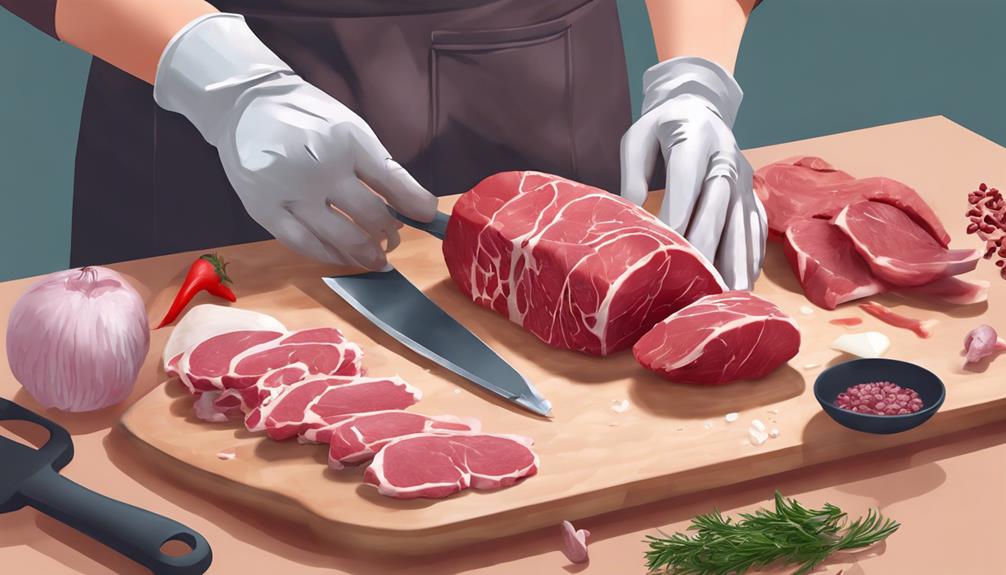
Ferrets are obligate carnivores, which means their diet should consist mainly of meat. It is important to feed them a balanced diet to ensure they receive all the necessary nutrients. When preparing raw food for ferrets, follow these essential guidelines:
- Use high-quality meat such as chicken, turkey, or rabbit, as the main ingredient. Avoid feeding them pork or fish, as they can be harmful to ferrets.
- Include organ meats like liver and heart to provide essential vitamins and minerals.
- Add small amounts of vegetables and fruits as treats, but remember that ferrets do not digest plant matter well.
- Be sure to include bones in their diet, as they help maintain dental health and provide necessary calcium.
- Always consult with a veterinarian or ferret nutritionist to ensure you are meeting your ferret's specific dietary needs.
By following these guidelines and providing a balanced raw diet, you can help ensure your ferret stays healthy and happy.
Ferret Dietary Requirements
Ferrets require a high-protein diet to maintain their optimal health and wellbeing. Meeting ferret nutritional needs is crucial for their overall health. A diet rich in protein helps support their rapid metabolism and aids in muscle development. Raw food benefits for ferrets include providing essential nutrients in their most natural form, which can be beneficial for their digestion and overall well-being.
When considering ferret nutritional needs, it's important to understand that they're obligate carnivores, meaning their diet should primarily consist of animal-based proteins. Raw food diets for ferrets often include a combination of raw meat, bones, and organs to mimic their natural diet in the wild. These ingredients provide the necessary protein, fat, and vitamins that ferrets need to thrive.
Incorporating raw food benefits into a ferret's diet can help improve their skin and coat health, increase energy levels, and support their immune system. By understanding ferret nutritional needs and the benefits of a raw food diet, ferret owners can ensure their furry companions lead healthy and happy lives.
Selecting High-Quality Ingredients
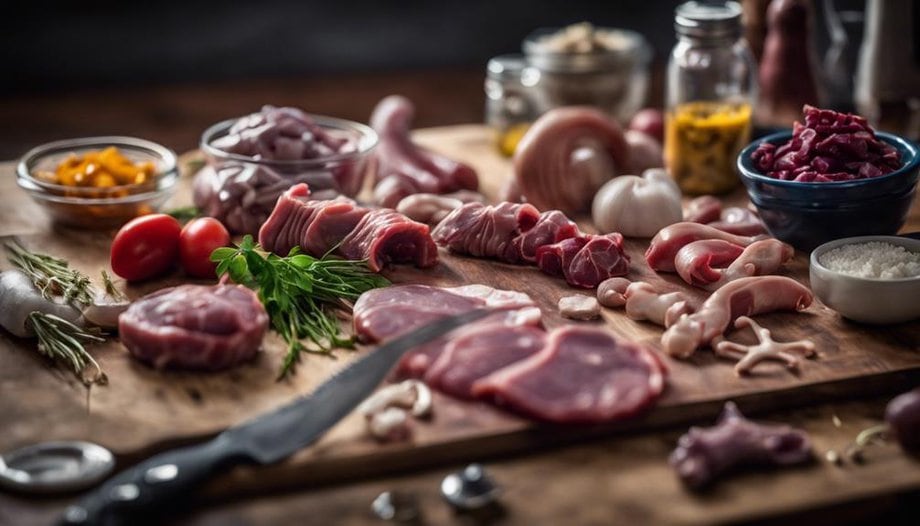
To ensure optimal health and well-being for ferrets through their diet, selecting high-quality ingredients is essential for meeting their nutritional requirements. Ingredient quality plays a crucial role in providing ferrets with the necessary nutrients for their overall health. When sourcing ingredients for raw food preparation, it's vital to choose fresh, uncontaminated meats and organs from reputable suppliers to ensure quality and safety.
Achieving nutritional balance is another key aspect to consider when selecting ingredients for a ferret's diet. Ferrets require a diet rich in protein and fat to mimic their natural carnivorous diet. Including a variety of high-quality meats such as chicken, turkey, and rabbit can help meet their protein needs. Additionally, incorporating organ meats like liver and heart can provide essential vitamins and minerals necessary for their well-being.
Supplementation may be necessary to ensure that ferrets receive all the essential nutrients they need. Consulting with a veterinarian or a ferret nutrition specialist can help determine if any additional supplements are required to maintain a balanced and nutritious diet for these unique pets.
Safe Handling Practices
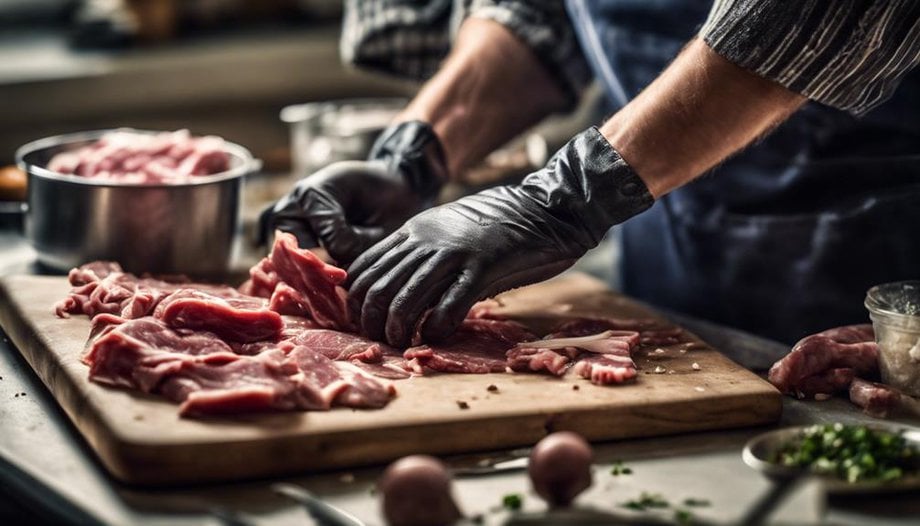
When handling raw food for ferrets, it's crucial to adhere to proper washing techniques to minimize the risk of contamination. Using separate cutting boards for raw meat and other ingredients helps prevent cross-contamination.
It's essential to refrigerate any leftovers promptly to maintain freshness and reduce the growth of harmful bacteria.
Proper Washing Techniques
After carefully selecting your raw food ingredients for your ferrets, the next crucial step involves mastering proper washing techniques to ensure their safety and well-being. Washing raw food before serving it to your ferrets is essential to remove any potential contaminants that may be present.
To properly wash raw food, start by rinsing it under cold running water. Use a gentle scrub brush to clean fruits and vegetables thoroughly. For meats, use a mild soap specifically designed for food, then rinse it well. Pay special attention to crevices where bacteria can hide.
Ensure that all surfaces, such as countertops and cutting boards, are sanitized after washing raw food to prevent cross-contamination. These practices are vital in maintaining the health of your ferrets.
Use Separate Cutting Boards
For safe handling practices when preparing raw food for ferrets, it's recommended to use separate cutting boards designated exclusively for raw meat and another for fruits and vegetables. This precaution helps prevent cross-contamination, a key aspect of food safety when dealing with raw ingredients.
Cross-contamination occurs when harmful bacteria from one type of food are transferred to another, potentially leading to foodborne illnesses. By using dedicated cutting boards for different food groups, ferret owners can significantly reduce the risk of cross-contamination.
It's essential to thoroughly clean and sanitize these cutting boards after each use to maintain a hygienic food preparation environment. Practicing this simple yet effective measure contributes to ensuring the safety and well-being of ferrets that consume raw food diets.
Refrigerate Leftovers Promptly
To maintain food safety standards when handling raw food for ferrets, it is crucial to promptly refrigerate any leftovers. Proper food storage is essential in leftover management to prevent bacterial growth and contamination.
Refrigerating leftovers promptly slows down bacterial multiplication, reducing the risk of foodborne illnesses in both humans and ferrets. When raw food is left at room temperature, bacteria can multiply rapidly, potentially reaching dangerous levels within a few hours.
Proper Food Preparation Techniques

When preparing raw food for ferrets, it's essential to employ proper food handling and processing techniques to ensure their nutritional needs are met effectively. Ensuring food safety and maintaining nutritional balance are crucial aspects of preparing raw food for ferrets.
- Wash Hands Thoroughly: Before and after handling raw food, it's important to wash hands with soap and water to prevent the spread of harmful bacteria.
- Clean Preparation Area: Sanitize all surfaces and utensils that come into contact with raw food to prevent cross-contamination.
- Use Fresh Ingredients: Select high-quality, fresh ingredients to provide essential nutrients and reduce the risk of spoilage.
Following these steps will help maintain the nutritional integrity of the raw food and reduce the chances of foodborne illnesses in ferrets. By implementing proper food preparation techniques, ferret owners can ensure that their pets receive a safe and balanced diet that supports their overall health and well-being.
Introducing Raw Food Gradually

When transitioning a ferret to a raw food diet, it's crucial to take a slow approach. Gradually introducing small amounts of raw food while monitoring the ferret's response is essential.
This method allows for the adjustment of the ferret's digestive system and ensures a successful transition to a raw diet.
Slow Transition Approach
How can one effectively introduce raw food gradually to a ferret's diet in order to ensure a smooth transition to this new feeding approach? When transitioning a ferret to a raw food diet, it's crucial to proceed slowly to prevent digestive upsets and ensure acceptance of the new diet. Here are some steps to help with the gradual introduction:
- Start with Small Amounts: Begin by mixing a small portion of raw food with the ferret's regular diet to acclimate them to the new taste and texture.
- Increase Proportion Over Time: Slowly increase the amount of raw food in each meal while decreasing the quantity of the previous diet to encourage the ferret to eat more raw food.
- Monitor Ferret's Response: Watch for any signs of digestive issues or reluctance to eat the raw food, adjusting the transition speed accordingly.
Monitoring Ferret's Response
To effectively introduce raw food gradually to a ferret's diet, keen observation of the ferret's response is essential in ensuring a successful transition to this new feeding approach. When introducing raw food, monitor the ferret for any behavior changes, such as increased interest or reluctance towards the new diet.
Weight management is crucial; monitor weight regularly to ensure the ferret is maintaining a healthy body condition. Keep an eye out for any digestive issues that may arise during the transition period, such as diarrhea or constipation. Additionally, observe the ferret's energy levels to ensure they remain active and alert.
Monitoring Ferret's Health
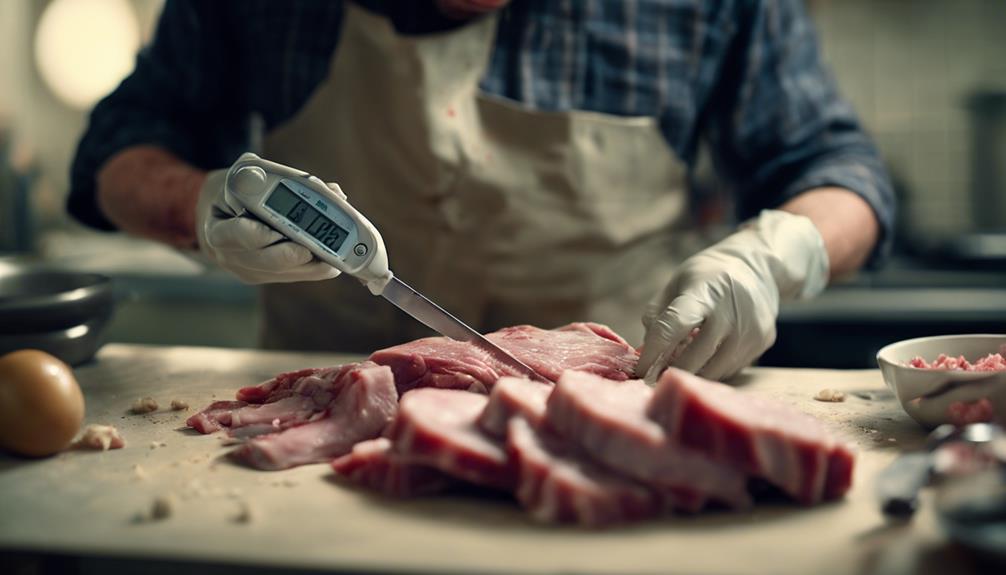
Regular monitoring of a ferret's health is essential to ensure their well-being and catch any potential issues early on. To assist ferret owners in maintaining their pet's health, here are some key health monitoring tips:
- Regular Veterinary Check-ups: Scheduling routine visits with a knowledgeable exotic animal veterinarian can help detect any health concerns before they escalate.
- Observation of Behavior and Activity Levels: Monitoring your ferret's behavior and activity can provide insight into their overall health status. Changes in appetite, energy levels, or behavior should be noted and investigated promptly.
- Regular Weighing and Body Condition Scoring: Keeping track of your ferret's weight and body condition can help in assessing their dietary balance and overall health. Sudden weight loss or gain could indicate underlying health issues that require attention.
Consulting With a Veterinarian
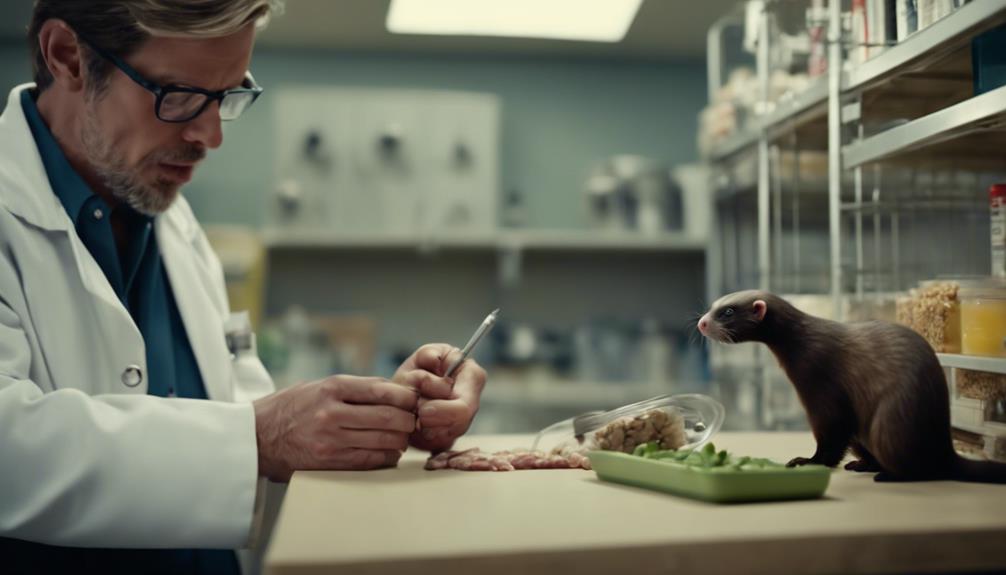
When seeking guidance on the health of your ferret, consulting with a veterinarian experienced in exotic animal care is crucial. A knowledgeable veterinarian can provide valuable insights into the specific dietary needs of ferrets, ensuring they receive adequate nutrition for optimal health. Ferrets have unique dietary requirements, including high protein content and certain vitamins and minerals that must be carefully balanced. A veterinarian can offer advice on how to achieve this balance through a combination of raw foods and potentially dietary supplements.
In addition to nutritional balance, a veterinarian can recommend appropriate dietary supplements if needed. These supplements can help address any deficiencies in the ferret's diet and promote overall well-being. Regular consultations with a veterinarian can also aid in monitoring your ferret's health and adjusting their diet as necessary to prevent any potential health issues. By working closely with a veterinarian, you can ensure that your ferret receives the best possible care and nutrition tailored to their individual needs.
Frequently Asked Questions
Can Ferrets Eat Raw Meat From the Grocery Store, or Does It Need to Be Specially Sourced for Them?
When selecting meat for ferrets, it's crucial to prioritize quality over convenience. While grocery store meat is an option, ensuring freshness and proper storage is key. Butcher-sourced meat often guarantees higher safety standards.
Are There Certain Fruits and Vegetables That Should Be Avoided When Preparing Raw Food for Ferrets?
When preparing raw food for ferrets, it's crucial to know safe options and avoid dangerous choices. Ferret-friendly produce includes organ meat, raw bones, and certain fruits like apples and vegetables such as carrots.
How Often Should Raw Food Be Fed to Ferrets, and Can It Be the Sole Source of Their Diet?
Feeding frequency for raw food in a ferret's diet should be moderate, ensuring a balanced nutritional intake. While it can be the primary source of sustenance, a gradual transition is recommended for optimal health benefits.
Are There Any Supplements That Need to Be Added to a Raw Food Diet for Ferrets to Ensure They Are Getting All Necessary Nutrients?
Supplement options are crucial for nutrient balance in a raw diet for ferrets. Homemade recipes can lack essential nutrients; thus, protein sources and specialized ferret supplements like taurine are vital additions to ensure a complete and balanced diet.
How Can I Tell if My Ferret Is Not Tolerating the Raw Food Diet Well and Needs to Switch Back to Commercial Ferret Food?
If signs of digestive upset or weight loss persist during the transitioning period to a raw food diet, it may be necessary to switch back to commercial ferret food. Observing adjustments in behavior and stool consistency is crucial.











